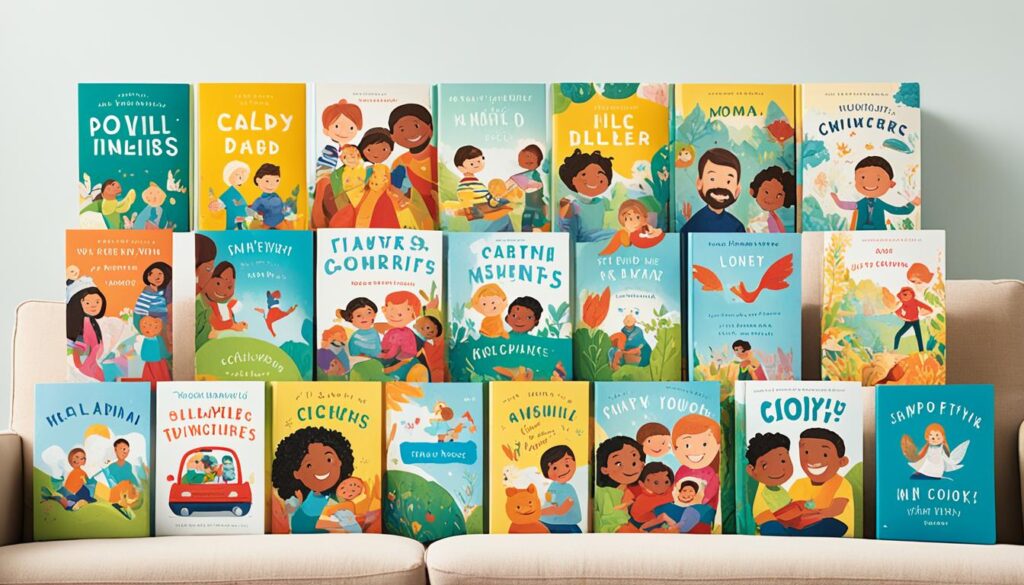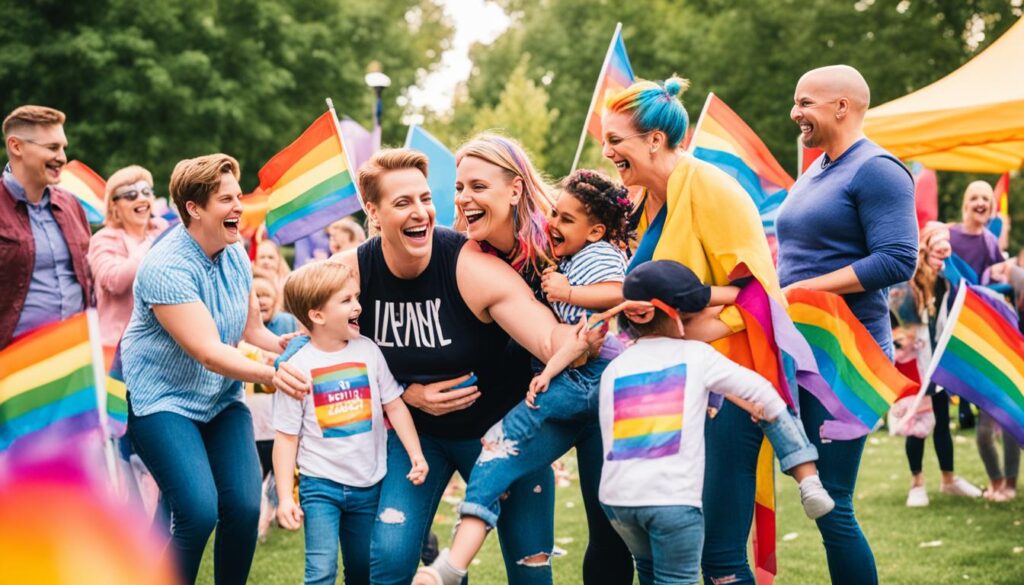Health and Environment
Unleash Positive Change Now: Foster Transformation in Parent-Child Relationships With This Simple Hack!
Awaken the potential for profound transformation in your parent-child relationship with this powerful yet simple hack – discover the key to igniting lasting connections.

You can ignite your parent-child relationship by dedicating quality time together. This simple hack holds immense power to nurture emotional connections, creating lasting memories and deepening the bond you share. Establishing a safe and supportive environment through meaningful conversations and shared activities enhances communication skills and empathy. Prioritize active listening to truly understand your child, building trust and promoting resilience. By fostering growth and development through curiosity, innovation, and problem-solving, you pave the way for a stronger, more connected bond. Spark positive change now with this transformative approach and witness the beautiful evolution of your relationship.
Key Takeaways
- Prioritize quality time for nurturing strong emotional connections and lasting memories.
- Cultivate empathy through shared activities and meaningful conversations.
- Create a safe environment for open communication and trust building.
- Enhance parent-child bond with active listening and empathy-building exercises.
- Foster resilience and growth by promoting understanding, support, and problem-solving skills.
Importance of Quality Time
Spending quality time with your children is essential for nurturing strong parent-child relationships and fostering emotional connections. Cultivating awe in everyday moments by engaging in activities like exploring nature, visiting new places, or trying out new hobbies can create lasting memories and deepen your bond with your child.
Development tells us that when you invest time in meaningful interactions, you aren't just present physically but also emotionally. Reading together, playing games, or simply having heart-to-heart conversations can build a foundation of trust, open communication, and mutual understanding.
These moments of connection are where the magic happens, where you can provide the emotional support, guidance, and positive reinforcement that your child needs to thrive. Research shows that the quality time you spend with your child has a significant impact on their emotional well-being, behavior, and academic success. So, make the most of these moments to strengthen your relationship and foster a deeper connection with your child.
Building Emotional Connection

Building emotional connection with your child is a journey of understanding and closeness. By cultivating empathy together, sharing vulnerabilities safely, and fostering trust through communication, you can strengthen the bond you share.
These simple yet powerful actions lay the foundation for a secure attachment that nurtures resilience and self-esteem in your child.
Cultivating Empathy Together
To initiate a deeper emotional connection with your child, actively listen to their feelings and perspectives, cultivating empathy together. By engaging in empathetic conversations, you create a safe space where your child feels understood and valued. Empathy is a powerful tool that not only strengthens your bond but also helps your child develop essential skills like emotional intelligence and compassion.
When you model empathy, you teach your child how to navigate and respond to their emotions and those of others. Through this shared experience of fostering empathy, you build a foundation of trust and understanding that can transform your parent-child relationship.
Sharing Vulnerabilities Safely
By consistently sharing vulnerabilities safely with your child, you can strengthen the emotional connection and trust in your parent-child relationship.
This simple yet powerful act involves being open and honest about your own struggles and vulnerabilities. When you show your child that it's okay to be imperfect, you create a safe space for them to do the same.
By modeling vulnerability, you not only build trust but also encourage your child to share their feelings and experiences with you. This practice cultivates empathy, emotional intelligence, and a deeper understanding between both of you.
Sharing vulnerabilities helps in strengthening the bond you share with your child, fostering open communication and a sense of security. Remember, it's through these shared moments of vulnerability that you build a strong foundation of trust and connection that will positively impact your relationship for years to come.
Fostering Trust Through Communication
Encouraging open and honest communication with your child fosters trust and strengthens the emotional connection between you both. By actively listening and showing empathy, you create a safe space for your child to share their thoughts and feelings without fear of judgment.
This openness paves the way for a deeper bond and understanding as you share your own experiences and emotions with them. Consistent, positive communication forms the bedrock of trust and mutual respect in your parent-child relationship.
Nurturing Safe Environment

Creating a nurturing and safe environment is essential for fostering positive parent-child relationships. When children feel safe, they're more likely to explore, try new things, and grow. Safety provides a foundation for them to take risks, learn from their experiences, and develop vital skills like critical thinking and creativity.
As a parent, your role in creating a secure space for your child is paramount. By ensuring their safety, you not only promote trust and open communication but also contribute to their emotional well-being. A safe environment encourages children to express themselves freely, knowing that they're protected and supported. It lays the groundwork for healthy relationships built on understanding and respect.
Meaningful Conversations

Having meaningful conversations with your child is essential for fostering a strong and supportive parent-child relationship. These conversations aren't just moments of chit-chat; they hold immense value in shaping your child's academic success, emotional well-being, and overall growth. By engaging in open, honest, and empathetic dialogues, you can create a safe space where your child feels heard and understood. Encouraging your child to express their thoughts, feelings, and viewpoints not only strengthens the bond between you but also nurtures their autonomy and self-confidence.
Research suggests that regular communication and active listening enhance problem-solving skills and conflict resolution abilities in parent-child relationships. When you prioritize meaningful conversations, you lay the foundation for a supportive environment where your child feels valued, respected, and empowered.
Shared Activities

Shared activities are an incredible way to strengthen your bond with your child. Engaging in activities like baking or crafting not only brings you closer together but also helps your child develop essential communication skills.
Bond Through Activities
Engaging in shared activities with your child cultivates a strong bond built on communication, trust, and connection. When you cook, garden, or play games together, you aren't just sharing tasks; you're building a foundation of understanding and closeness.
These shared moments provide opportunities for both of you to learn and grow, creating a space for teamwork, problem-solving, and emotional bonding. As you collaborate on different activities, you strengthen your relationship by working together towards a common goal.
These shared experiences create lasting memories that deepen the connection between you and your child. So, whether you're baking cookies, planting flowers, or solving puzzles, remember that these activities aren't just about the task at hand; they're about the bond you're building.
Embrace these moments of togetherness, as they're the threads weaving a tapestry of love and connection in your parent-child relationship.
Enhance Communication Skills
Strengthen your parent-child bond by enhancing communication skills through shared activities. Engaging in activities like cooking together or playing a board game can work wonders for improving how you connect with each other.
These shared experiences provide the perfect setting for meaningful conversations and deeper understanding between you and your parents. Research even backs this up, showing that regular shared activities can boost your communication skills and make your relationship stronger.
When you talk during these activities, you'll find it easier to express yourself and build trust with your parents. By taking part in these shared moments, your parents can create a warm and supportive atmosphere that encourages effective communication with you.
Strengthening Parent-Child Bond

Enhancing the bond between parents and children involves fostering a deep sense of trust and connection through consistent communication and quality time together. Building a strong parent-child relationship isn't just about being physically present but also about actively engaging with your child. Research has shown that a positive parent-child bond is essential for your child's overall well-being and development.
By spending quality time together, you aren't only creating lasting memories but also laying the foundation for a strong, trusting relationship. Effective communication, where both parties feel heard and understood, is key to nurturing this bond. By listening attentively to your child's thoughts and feelings, you're showing them that their voice matters. A secure attachment between parent and child can boost your child's self-esteem, resilience, and mental health.
Enhancing Communication Skills

Improving your communication skills with your child is key to building a strong and trusting relationship. By actively listening and showing empathy, you can create a safe space for open discussions and emotional validation.
These practices can lead to better understanding, increased connection, and a more harmonious parent-child dynamic.
Active Listening Importance
To enhance communication skills in parent-child relationships, prioritize the importance of active listening. Essential listening is a crucial tool that can help you truly understand and connect with your child. It involves giving your full attention to what your child is saying, without jumping in with your own thoughts or judgments.
By actively listening, you show your child that their words are valued and that you care about their feelings. This promotes empathy, trust, and a deeper emotional bond between you and your child. When you practice active listening, you create a safe space where your child feels heard and respected.
This simple yet powerful communication hack can lead to improved conflict resolution, increased cooperation, and stronger relationships within your family. So, next time you're talking with your child, remember to listen actively, with an open heart and mind, to nurture a deeper connection and understanding between you.
Empathy Building Exercises
Engage your child in empathy building exercises to foster stronger communication skills and deeper connections within your parent-child relationship. By participating in activities that promote empathy, your child can enhance their emotional intelligence and understanding of others' perspectives. These exercises not only help in developing compassion but also in improving conflict resolution and problem-solving abilities during interactions with you.
Here's a visual breakdown of the benefits of empathy building exercises:
| Benefits of Empathy Building Exercises |
|---|
| Enhances communication skills by encouraging active listening |
| Develops emotional intelligence, empathy, and compassion |
| Improves conflict resolution and problem-solving abilities |
| Builds stronger relationships with parents |
| Creates a more supportive and understanding environment |
Encouraging empathy in your child through these exercises can lead to a more harmonious and understanding relationship between you both. So, why not start incorporating these activities today to see the positive impact they can have on your parent-child bond?
Creating Resilient Relationships

Building resilient relationships with your child requires a foundation of trust, communication, and emotional support. By nurturing these essential elements, you create a strong bond that helps your child navigate life's ups and downs with confidence.
Resilient parent-child relationships provide a safe space for your child to express themselves openly, knowing they're heard and understood. Teaching your child problem-solving skills and coping strategies is key to developing resilience. Encourage them to face challenges head-on and learn from setbacks, empowering them to grow stronger through adversity.
When your child feels secure in your relationship, they're more likely to seek your guidance during tough times, building a lasting connection based on mutual trust and respect.
Promoting Growth and Development

Encouraging your child's natural curiosity and exploration is crucial to promoting their growth and development. By supporting their inquisitive nature, you're laying down the foundation for a future filled with endless possibilities.
Creating a safe space for them to explore, make mistakes, and learn from them is essential. Remember, growth often comes from taking risks and trying new things. It's okay for them to experiment and sometimes even fail because those experiences shape their innovative thinking and problem-solving skills.
Soft skills like collaboration and creativity are just as important for their success as academic achievements. Encourage them to work with others, share ideas, and think outside the box. These skills won't only benefit their personal growth but also prepare them for the challenges they may face in the future.
Transformative Outcomes

Transforming parent-child relationships can lead to profound and lasting changes in both emotional well-being and overall development. By implementing secure attachment practices and fostering positive interactions, you can witness transformative outcomes in various aspects of your child's life. Take a look at the table below to see how this simple hack can make a significant impact on your child's growth and well-being:
| Transformative Outcomes | Effects on Children's Development |
|---|---|
| Better emotional regulation | Improved social skills and academic success |
| Enhanced self-esteem | Increased confidence and sense of self |
| Trust and communication | Stronger parent-child bond and mutual respect |
| Safe and supportive environment | Overall well-being and positive behaviors |
Frequently Asked Questions
What Are the 4 C's of Positive Parenting?
The 4 C's of positive parenting are curiosity, creativity, collaboration, and critical thinking. They're essential for building strong parent-child relationships.
By nurturing these skills, you help your child grow into a well-rounded individual. These competencies focus on developing essential soft skills important for success in today's fast-paced world.
Embracing the 4 C's can improve communication, problem-solving, and emotional intelligence in your interactions with your child.
What Do Foster Kids Need the Most?
Foster kids need stability, emotional support, access to mental health services, academic support, and positive adult role models. These elements help them heal, feel safe, address challenges, succeed academically, and have guidance on their journey.
By providing consistency, understanding, therapy, educational assistance, and mentorship, you can positively impact a foster child's life and help them reach their full potential.
Your support matters greatly in their healing and growth.
What Is the Scripture for Dealing With a Difficult Child?
When dealing with a difficult child, remember the scripture is about creating a safe, nurturing environment.
Understand their needs, use authoritative parenting, and apply practical tips from developmental science.
Focus on empathy, resilience, and emotional intelligence to navigate challenges effectively.
Implement one tip at a time to strengthen your bond and foster positive transformation in your relationship.
Your efforts will make a significant impact on your child's growth and well-being.
How to Calm a Child Down When Angry?
When your child is angry, try acknowledging their feelings first. Validate their emotions, showing you understand. Encourage deep breaths or counting to 10 to help them calm down. Offer a safe space for them to express themselves freely.
Engage in calming activities like drawing or listening to music together. Remember, modeling healthy coping strategies is key. By showing them how to manage anger positively, you're teaching them valuable skills for life.
Conclusion
Now is the time to take action and make a difference in your parent-child relationship. By spending quality time together, building emotional connections, and fostering a safe environment, you can create resilient bonds that promote growth and development.
Start having meaningful conversations, engaging in shared activities, and enhancing your communication skills today. The transformative outcomes will be worth the effort, leading to a stronger, more fulfilling relationship with your parent or child.
Take the first step towards positive change now!
Amina brings over a decade of journalism experience to her role as Editor-in-Chief. Under her leadership, Exquisite Post has flourished, maintaining the highest standards of integrity and excellence. Amina’s commitment to truth and her visionary approach guide the editorial team in producing impactful news stories that resonate with our audience.
Health and Environment
Small Mistakes, Big Impact: Navigating Life’s Tiny Pitfalls

We all make mistakes, but it’s often the small ones that can have the most significant impact on our lives. In this article, we’ll explore the world of minor missteps and how they can shape our future. Let’s dive into the realm of common mistakes and life lessons to help you navigate life’s journey more smoothly.
Understanding Small Mistakes
Small mistakes are those seemingly insignificant errors we make in our daily lives. They might appear harmless at first, but over time, they can accumulate and lead to bigger problems. It’s crucial to recognize these minor slip-ups and learn from them to avoid derailing your life’s trajectory.
Frequency of Common Small Mistakes
Common Small Mistakes That Can Derail Your Life
Let’s take a look at some of the most frequent small mistakes people make and how they can impact various aspects of life:
- Financial missteps (e.g., forgetting to pay bills on time)
- Relationship oversights (e.g., neglecting to communicate effectively)
- Career blunders (e.g., procrastinating on important tasks)
- Health and wellness slip-ups (e.g., skipping regular check-ups)
For a more in-depth look at these mistakes, check out Know Your Best article on 6 Small Mistakes That Can Derail Your Life.
Tools for Avoiding Life’s Pitfalls
The Psychology Behind Small Mistakes
Understanding why we make small errors is crucial for personal development and growth. Often, these mistakes stem from:
- Lack of attention to detail
- Overconfidence in our abilities
- Fatigue or stress
- Habitual behavior patterns
By recognizing these factors, we can work on improving our decision-making processes and reduce the likelihood of making small but impactful mistakes.
47% of participants reported significant distraction at work 80% of drivers believe they are better-than-average
Fatigue leads to 13% of workplace injuries
It takes an average of 66 days to form a new habit
Lack of attention to detail
Overconfidence in abilities
Fatigue or stress
Habitual behavior patterns
Strategies for Avoiding Common Small Mistakes
Developing a proactive approach to self-improvement and motivation can help you minimize small mistakes. Here are some effective strategies:
- Develop self-awareness through reflection and mindfulness
- Create effective systems and habits to automate good decisions
- Practice mindfulness in decision-making
- Learn from others’ experiences and mistakes
Turning Small Mistakes into Opportunities for Growth
Instead of dwelling on your mistakes, use them as stepping stones for personal growth. Here’s how you can turn small errors into valuable learning experiences:
- Embrace a growth mindset
- Analyze what went wrong and why
- Develop action plans to prevent similar mistakes in the future
- Share your lessons with others to help them avoid the same pitfalls
Remember, learning from mistakes is an essential part of personal development and can lead to greater success in all areas of life.
Conclusion: Embracing Imperfection and Continuous Improvement
Small mistakes are an inevitable part of life, but they don’t have to define us. By recognizing these minor slip-ups, learning from them, and using them as opportunities for growth, we can navigate life’s journey more successfully. Remember, it’s not about being perfect; it’s about continuous improvement and resilience in the face of challenges.
As
Health and Environment
Discover the Magic of Mushroom Coffee: Ryze Organic

Coffee lovers, get ready to embark on a journey into the world of Mushroom Coffee Ryze Organic! This innovative blend is taking the coffee scene by storm, offering a unique twist on your daily brew. Let’s dive into what makes Ryze Coffee stand out from the crowd and why it might just become your new favorite morning ritual.
The Unique Attributes of Ryze Organic Mushroom Coffee
Ryze Coffee isn’t your average cup of joe. This remarkable blend combines the rich flavor of coffee with the powerful benefits of medicinal mushrooms. Here’s what sets it apart:
- A blend of 6 organic medicinal mushrooms
- Sustained energy and focus without the jitters
- Low acidity, gentle on your stomach
- Precise dosing with a convenient measuring spoon
With Ryze, you’re not just drinking coffee; you’re nourishing your body and mind. Learn more about the health benefits of mushroom coffee.
Sourcing and Quality Assurance
Ryze Coffee takes pride in its commitment to quality and transparency. Here’s what you need to know about their sourcing and testing processes:
- Ingredients sourced from US family farms
- Rigorous third-party testing for safety and efficacy
- Emphasis on effectiveness and safety in every batch
When you choose Ryze, you’re selecting a product that’s been vetted for quality and safety.
Brewing and Enjoying Ryze Coffee
Ready to try Ryze Coffee for yourself? Here’s what you need to know about brewing and enjoying this unique blend:
- Each cup contains 48mg of caffeine
- Use the included measuring spoon for perfect dosing
- Can be enjoyed hot or cold
For more brewing tips and techniques, check out Coffee Lovers 101 comprehensive brewing guides.
Caffeine Content Comparison
Health Benefits and Wellness Considerations
Ryze Coffee isn’t just about taste; it’s about supporting your overall wellness. Here are some potential benefits of incorporating medicinal mushrooms into your daily routine:
- Enhanced immune function
- Improved cognitive performance
- Increased energy and stamina
Curious about how Ryze Coffee fits into your wellness routine? Discover more health and wellness tips.
Frequently Asked Questions
Key Benefits of Medicinal Mushrooms in Ryze Coffee
- Chaga: Antioxidant properties, reduces inflammation, improves immune function
- Lion’s Mane: Neuroprotective properties, improves cognitive function and memory
- Cordyceps: Enhances energy and stamina
- Reishi: Immunomodulatory properties, regulates the immune system
- Ryze Coffee: 100mg caffeine per serving, organic coffee beans, no added sugars or artificial flavors
Is Ryze Organic Mushroom Coffee Right for You?
As we wrap up Coffee Lovers 101 journey through the world of Ryze Organic Mushroom Coffee, you might be wondering if it’s the right choice for you. Here are some key points to consider:
- If you’re looking for a gentle, stomach-friendly coffee alternative, Ryze could be perfect.
- For those interested in the potential health benefits of medicinal mushrooms, Ryze offers an easy way to incorporate them into your daily routine.
- If you enjoy experimenting with new flavors and coffee experiences, Ryze provides a unique taste adventure.
Remember, Ryze Coffee is more than just a beverage – it’s a lifestyle choice that supports your wellness journey. Whether you’re a seasoned coffee connoisseur or just starting to explore the world of specialty coffees, Ryze Organic Mushroom Coffee offers a blend of tradition and innovation that’s worth trying.
Ready to take the plunge? Explore Coffee Lovers 101 complete guide to Ryze Coffee and start your mushroom coffee adventure today!
As you embark on your Ryze Coffee journey, remember that the world of coffee is vast and exciting. Keep exploring, keep tasting, and most importantly, keep enjoying every sip. Here’s to your health, wellness, and the perfect cup of mushroom coffee!
Health and Environment
Navigating LGBTQ+ Parenting in the Digital Era
Explore the journey of LGBTQ+ parenting in the genetic era with insightful guidance and digital tools for the modern family.

LGBTQ+ parents are facing unique challenges in the digital age. With the rise in anti-trans and anti-LGBTQ legislation, creating a safe space for children to navigate their identities has become more crucial than ever. How can LGBTQ+ parents overcome these challenges and find support and acceptance in the modern digital landscape?
In the age of social media and online communities, many LGBTQ+ parents are turning to digital platforms to connect with others who share their experiences. These online spaces provide a safe haven where parents can seek advice, share their stories, and find support. However, despite these digital resources, there is still progress to be made in terms of visibility and acceptance for LGBTQ+ families.
Key Takeaways:
- LGBTQ+ parents face unique challenges in the digital age.
- Creating a safe space is crucial for children to navigate their identities.
- Online communities and resources provide support for LGBTQ+ parents.
- Visibility and acceptance for LGBTQ+ families still need improvement.
- Support and understanding from society are essential for LGBTQ+ parents and their families.
The Importance of Safe Spaces and Acceptance
LGBTQ+ parents understand the importance of creating safe spaces for their children to explore and express their identities. These spaces provide a supportive environment where children can freely embrace their true selves and find acceptance.
Many schools, such as The Harker School in San Jose, California, recognize this need and have taken steps to establish LGBTQ+ clubs and support groups. These initiatives play a crucial role in fostering a positive and inclusive atmosphere within educational institutions, ensuring that LGBTQ+ children have access to the support they need.
“Creating an environment where everyone feels safe, respected, and included is a top priority for us,” says Jane Doe, Principal at The Harker School. “Our LGBTQ+ clubs and support groups not only provide a safe space but also promote understanding, empathy, and allyship among our students.”
In recent years, increased acceptance has been observed among young people, leading to a more normalized view of queerness. However, challenges and prejudices still persist, making it essential for LGBTQ+ parents to continue advocating for the rights and well-being of their children.
Creating Supportive LGBTQ+ Communities
The importance of LGBTQ+ communities cannot be overstated. These communities serve as pillars of support, providing resources, guidance, and a sense of belonging to LGBTQ+ parents and families.
Online platforms, such as LGBTQ+ parenting forums and social media groups, offer opportunities for LGBTQ+ parents to connect and share their experiences. These spaces not only provide a sense of community but also enable parents to access valuable information, advice, and support from individuals who have faced similar challenges.
Through these communities, LGBTQ+ parents can find solace, establish meaningful connections, and gain the strength to navigate the changing social landscape. By fostering a sense of solidarity, LGBTQ+ communities play a vital role in empowering individuals and building a more accepting society for all.
Addressing the Need for Acceptance
While progress has been made in terms of LGBTQ+ rights and acceptance, it is crucial to recognize that there is still work to be done. LGBTQ+ parents continue to face various challenges, including discrimination, prejudice, and limited access to resources.
By advocating for their children’s rights and openly discussing LGBTQ+ parenting, parents contribute to raising awareness and promoting acceptance in society. It is through these efforts that we can build a more inclusive world, where LGBTQ+ parents and their children can thrive without fear of discrimination or judgment.
The Role of Online Communities
The internet has revolutionized the way LGBTQ+ parents connect and find support. Online communities and social media platforms have become valuable spaces for individuals to seek acceptance, share experiences, and receive support from like-minded individuals. This virtual network has created a sense of belonging and has significantly contributed to reducing isolation for LGBTQ+ parents and their families.
Through online communities, LGBTQ+ parents can navigate the unique challenges they face by exchanging advice, resources, and stories. Online platforms provide a safe environment where individuals can find people who share similar experiences and understand the nuances of LGBTQ+ parenting.
“Online communities give me a sense of community and acceptance that I might not find offline. It’s comforting to know that I’m not alone in this journey and that there are others who can relate to my experiences.” – Sarah, LGBTQ+ parent
In addition to emotional support, these virtual spaces also serve as a platform for advocacy and empowerment. LGBTQ+ parents can join forces to advocate for policy changes, challenge stereotypes, and fight discrimination. Online communities offer a stage for visibility and resilience, creating a strong collective voice for LGBTQ+ parenting rights.
However, when engaging with online communities, it is important to exercise caution and prioritize privacy and safety. LGBTQ+ parents should be mindful of sharing personal information and be aware of potential risks associated with online interactions. It is crucial to practice digital safety measures and verify the authenticity of online groups and individuals before disclosing personal information.

Navigating Laws and Policies
Despite the significant progress made in LGBTQ+ rights, there is still a concerning number of laws and policies that specifically target LGBTQ+ youth and families. In fact, as recent as 2023, over 550 anti-LGBTQ+ bills were introduced in state legislatures, revealing an ongoing battle for equality and acceptance. As a result, LGBTQ+ parents face the challenging task of navigating through the complex and ever-changing legal landscape.
“The existence of discriminatory laws and policies poses a significant barrier to LGBTQ+ parents seeking to provide a safe and inclusive environment for their children. These legal obstacles perpetuate discrimination and hinder the progress we have made in achieving equality.”
Organizations such as Family Equality recognize the importance of providing resources and information to empower LGBTQ+ parents in their journey to navigate these discriminatory laws and policies. By offering a comprehensive understanding of legislation and its impact on LGBTQ+ families, Family Equality equips parents with the knowledge they need to advocate for their rights and the well-being of their children.
Legislation Affecting LGBTQ+ Parenting
It is crucial for LGBTQ+ parents to educate themselves on the specific legislation that directly impacts their rights and well-being. This includes understanding the intricacies of adoption laws, parental recognition, custody battles, and healthcare access for both parents and children.
Here are a few examples of legislation that LGBTQ+ parents commonly encounter:
- Parental Recognition: Laws that determine legal recognition of LGBTQ+ parents, including second-parent adoption, stepparent adoption, and de facto parentage.
- Adoption and Foster Care: Laws that regulate LGBTQ+ individuals’ ability to adopt children, become foster parents, or provide safe and loving homes for children in need.
- Healthcare Access: Laws that affect access to healthcare for LGBTQ+ parents and their children, including insurance coverage, medical decision-making, and discrimination protections.
- Education and School Policies: Laws that impact LGBTQ+ parent involvement in their children’s education, school policies regarding LGBTQ+ inclusivity, and bullying prevention.
Understanding these laws and staying informed about any updates or changes is crucial for LGBTQ+ parents seeking to protect their families and ensure their legal rights are upheld.
Advocacy and Mobilization
Through education, advocacy, and mobilization efforts, LGBTQ+ parents are working towards a future where their rights and the well-being of their children are protected. By collaborating with organizations like Family Equality, LGBTQ+ parents have access to a network of support, legal guidance, and resources to navigate the legal landscape while actively working towards positive change.
The fight for equality goes beyond individual families—it extends to the broader LGBTQ+ community. By joining forces with other LGBTQ+ parents, activists, and allies, LGBTQ+ families can collectively challenge discriminatory laws and policies and demand fair treatment and equal rights for all.
| Legislation | Impact |
|---|---|
| Parental Recognition | Determines legal recognition of LGBTQ+ parents, affecting parental rights, adoption, and custody. |
| Adoption and Foster Care | Regulates LGBTQ+ individuals’ ability to adopt or foster children, impacting the creation of safe and loving homes. |
| Healthcare Access | Affects access to healthcare for LGBTQ+ parents and their children, including insurance coverage and medical decision-making. |
| Education and School Policies | Impacts LGBTQ+ parent involvement in education and school policies related to LGBTQ+ inclusivity and bullying prevention. |
By understanding these laws and actively engaging in advocacy efforts, LGBTQ+ parents are becoming agents of change, pushing for comprehensive legal protections for all LGBTQ+ families.
Remaining informed, empowered, and resilient in the face of discriminatory laws and policies is essential for navigating the complexities of LGBTQ+ parenting. It is through education, support, and a shared commitment to equality that LGBTQ+ parents can create a safer and more inclusive future for themselves and their children.
Inclusive Children’s Books
LGBTQ+ parents understand the importance of providing their children with inclusive books that represent the diversity of LGBTQ+ families. These books play a vital role in fostering a sense of belonging, promoting acceptance, and celebrating different identities. Here at Family Equality, we curate an up-to-date list of inclusive children’s books that depict LGBTQ+ families in a loving and respectful manner.
By offering these books to their children, LGBTQ+ parents can provide them with stories that reflect their own experiences and identities. Representation matters, and inclusive children’s books allow children to see themselves and their families depicted positively in literature. It helps them develop a sense of pride and confidence in who they are.
Our curated list covers a wide range of themes, from same-sex parents to transgender and non-binary individuals. These books promote understanding, empathy, and diversity among children and provide a window into the lives of LGBTQ+ families. Through these stories, children learn about love, acceptance, and the importance of respecting others’ differences.
Reading inclusive children’s books is not only beneficial for LGBTQ+ families but also for all children. It encourages them to embrace diversity, challenge stereotypes, and build a more inclusive society.
Here’s a sample of some of the inclusive children’s books you can find on our list:
| Title | Author | Illustrator |
|---|---|---|
| And Tango Makes Three | Justin Richardson | Peter Parnell |
| Julián is a Mermaid | Jessica Love | Jessica Love |
| Heather Has Two Mommies | Lesléa Newman | Diana Souza |
| Introducing Teddy | Jess Walton | Dougal MacPherson |

Remember, exposure to diverse stories is crucial in promoting acceptance and understanding among children. By embracing inclusive children’s books, we can create a more inclusive and welcoming world for all families.
Parenting Trans Youth
Parenting trans youth requires additional education and support. LGBTQ+ parents of trans youth must navigate medical appointments, school environments, and societal attitudes. Supporting trans youth often means becoming advocates for their rights and challenging harmful policies and stereotypes.
“As parents of trans youth, we have to be their greatest allies. We need to educate ourselves, stand up for their rights, and create a safe and accepting environment,” says Sarah Thompson, parent and LGBTQ+ advocate.
Medical appointments play a crucial role in the journey of trans youth. From hormone therapy to gender-affirming surgeries, it is essential to find healthcare providers who specialize in transgender care. LGBTQ+ parents can consult organizations like Family Equality for guidance and resources in finding trans-friendly healthcare professionals.
In addition to healthcare, schools play a significant role in the lives of trans youth. It is essential for LGBTQ+ parents to engage with their child’s school, advocating for policies that support gender identity and inclusion. Organizations like the Gender Spectrum provide educational resources and guidance for parents navigating school environments.
“When my child came out as trans, I reached out to the school to ensure they had the necessary support systems in place. Being an advocate for my child and educating the administration has made a positive impact on their experience,” shares Alex Rodriguez, parent and LGBTQ+ activist.
Societal attitudes towards transgender individuals can be challenging, with discrimination and prejudice still prevalent. As parents, it is crucial to develop support networks both for ourselves and our trans children. Organizations like TransYouth Equality Foundation offer resources, support groups, and activities to connect LGBTQ+ parents of trans youth.
“By participating in LGBTQ+ advocacy and supporting organizations that uplift trans youth, we can create a more inclusive and accepting society for our children,” emphasizes Rachel Turner, parent and LGBTQ+ ally.
Trans Youth Parenting Resources
Here are some resources for LGBTQ+ parents navigating the unique challenges of parenting trans youth:
- TransYouth Equality Foundation: Provides resources and support for families of transgender youth.
- Gender Spectrum: Offers educational resources and support for parents navigating gender diversity.
- Family Equality: Connects LGBTQ+ parents and provides resources on various topics, including trans youth parenting.
Inspiring stories of parents and their trans youth have raised awareness and built bridges of understanding. “We must continue to support and uplift trans youth, ensuring they have the love and acceptance they deserve,” says Emily Martin, LGBTQ+ advocate.

LGBTQ+ Parents and Social Media
LGBTQ+ parents have found social media to be a valuable tool in their parenting journey. It allows them to connect with others, share experiences, and amplify their voices. Social media platforms provide a space for LGBTQ+ parents to seek support, celebrate milestones, and raise awareness about the unique challenges they face.
On social media, everyday posts can unintentionally become acts of advocacy, shedding light on the struggles and triumphs of LGBTQ+ families. By sharing their stories, LGBTQ+ parents not only create visibility for themselves but also serve as a source of inspiration and support for others. Through these platforms, they can detect disapproval, identify allies, and build a strong network of individuals who understand their experiences.
“Social media has allowed me to connect with LGBTQ+ parents from all over the country. We can share resources, offer advice, and lift each other up during challenging times. It’s like having a virtual support group at my fingertips,” says Sarah, a proud LGBTQ+ parent.
However, privacy and disclosure become complex issues for LGBTQ+ parents navigating social media. The line between sharing personal stories and protecting their family’s privacy can be blurry. It’s a collective responsibility shared with partners, children, and extended family members. LGBTQ+ parents carefully consider the disclosure of personal information and set boundaries to safeguard their privacy.
Disclosure and Privacy Boundaries
When it comes to disclosure, LGBTQ+ parents have the right to decide how much information they want to share publicly. They consider factors such as their child’s age and readiness, their family’s comfort level, and potential risks they may face due to discrimination or prejudice.
Privacy settings on social media platforms play a crucial role in maintaining control over the visibility of personal information. LGBTQ+ parents often utilize these settings to create a safe and private online space for their family. By carefully managing their profiles and controlling who can access their content, they can navigate social media while preserving their privacy.

Advocacy through Online Spaces
Beyond personal narratives, LGBTQ+ parents leverage social media as a platform for advocacy. They use hashtags, participate in online campaigns, and share informative content to raise awareness about LGBTQ+ parenting and promote inclusivity. Through these digital channels, they contribute to the larger movement for LGBTQ+ rights and acceptance.
Online spaces also provide opportunities for LGBTQ+ parents to engage in dialogue with policymakers, educators, and healthcare professionals. By sharing their experiences and insights, they can educate others and advocate for policy changes that benefit LGBTQ+ families.
As LGBTQ+ parents navigate social media, it is essential for them to strike a balance between sharing their stories, advocating for their rights, and safeguarding their privacy. By doing so, they contribute to the visibility and acceptance of LGBTQ+ families in the digital landscape.
Overcoming Obstacles and Discrimination
Despite the growing acceptance of LGBTQ+ families, obstacles and discrimination still persist. LGBTQ+ parents face unique challenges in various aspects of their lives, including limited access to adoption services and prejudice within healthcare and educational institutions.
One of the major obstacles faced by LGBTQ+ parents is the difficulty in accessing adoption services. Many LGBTQ+ individuals and couples encounter discrimination when attempting to adopt, facing biased regulations and unfair selection processes. This discrimination not only denies children loving homes but also perpetuates harmful stereotypes about LGBTQ+ parenting.
Discrimination in healthcare and educational institutions is another significant hurdle for LGBTQ+ parents. This discrimination can manifest in different ways, including misgendering and lack of inclusivity in healthcare settings, as well as biases and insensitivity in educational environments. These experiences can have a detrimental impact on the well-being and development of LGBTQ+ families.
“Discrimination against LGBTQ+ parents denies children loving homes and perpetuates harmful stereotypes.”
Despite these challenges, LGBTQ+ parents find strength and support in organizations like Family Equality. These organizations provide resources, information, and a sense of community for LGBTQ+ families, helping them navigate the obstacles they face.
In addition to seeking support, LGBTQ+ parents can engage in advocacy work to overcome discrimination and create a more inclusive society. By sharing their experiences, challenging biases, and working towards positive change, LGBTQ+ parents contribute to a more accepting and equal future for all.

The Shift in Social Movements
Social movements advocating for LGBTQ+ rights have made significant progress in recent years, leading to increased acceptance and recognition of LGBTQ+ families. One notable milestone was the legalization of same-sex marriage, which granted LGBTQ+ couples the same legal rights and privileges as heterosexual couples.
However, despite these advancements, discrimination and stigma towards LGBTQ+ individuals and families still persist. This ongoing bias highlights the importance of continued activism and advocacy work to ensure equal rights and opportunities for LGBTQ+ parents and their children.
The evolving landscape of social movements has also impacted how LGBTQ+ parents navigate their public and private identities. As societal attitudes shift, disclosure decisions become increasingly complex. LGBTQ+ parents must consider the potential consequences and reactions when deciding whether to disclose their family structure in various contexts.
“The ongoing fight for LGBTQ+ rights and recognition reminds us that progress is not always linear. It requires ongoing effort and collective action to challenge prejudice and create a more inclusive society for all.”
Recognizing the importance of LGBTQ+ parenting and the need for acceptance, many organizations, such as Family Equality, focus on providing support and resources for LGBTQ+ parents and families. By offering inclusive programs, educational materials, and community-building events, these organizations strive to create a more welcoming environment for LGBTQ+ families.
The Impact of Shifting Social Movements
The shift in social movements has had a profound impact on the experiences of LGBTQ+ parents. The increasing visibility and acceptance of LGBTQ+ individuals have created a more supportive environment for LGBTQ+ families. However, the fight for equal rights and recognition is far from over, and there is still work to be done to eradicate discrimination and prejudice.
By understanding the complexities of navigating public and private identities and supporting initiatives that promote acceptance, we can contribute to a more inclusive and understanding society for all families, regardless of their sexual orientation or gender identity.
In the next section, we will explore the various forms of support available for LGBTQ+ parents and families, including community resources and online networks.
Supporting LGBTQ+ Parents and Families
Providing support and resources for LGBTQ+ parents and families is crucial in creating an inclusive and welcoming environment. Organizations like Family Equality and online communities offer a wide range of tools, advice, and a strong sense of community for LGBTQ+ parents.
Family Equality, a leading organization dedicated to LGBTQ+ parenting, offers valuable resources to help navigate the challenges of LGBTQ+ families. Their website provides information on legal rights, parenting tips, and support networks, ensuring that LGBTQ+ parents have access to the resources they need.
“Family Equality has been a lifeline for my partner and me. Their support and guidance have helped us navigate the complexities of LGBTQ+ parenting and feel connected to a larger community that understands our unique experiences.” – Sarah, LGBTQ+ parent
In addition to organizations like Family Equality, online communities play a significant role in connecting LGBTQ+ parents and providing support. These communities offer a safe and welcoming space for parents to share their experiences, seek advice, and find validation in their parenting journey.
By fostering acceptance and providing inclusive resources, society can create a more supportive environment for LGBTQ+ families. It is essential for individuals and communities to champion equality and celebrate the diversity of families, ensuring that LGBTQ+ parents and their children feel supported and accepted.
Community Support and Engagement
Community support plays a vital role in the lives of LGBTQ+ parents and families. Engaging with local LGBTQ+ organizations, attending events, and participating in support groups can provide a sense of belonging and connection to others who share similar experiences.
Forming friendships and support networks with other LGBTQ+ families can provide a valuable support system, offering understanding, empathy, and practical advice. These connections help alleviate feelings of isolation and provide a space for LGBTQ+ parents to seek guidance and share their triumphs and challenges.
Additionally, LGBTQ+ parents can find support and community through online platforms, such as LGBTQ+ parenting forums, social media groups, and virtual meetups. These digital spaces offer a convenient and accessible way to connect with other LGBTQ+ parents around the world, regardless of geographical location, and gain valuable insights and perspectives.
Access to Resources and Education
Access to resources and education is crucial for LGBTQ+ parents to navigate the unique challenges they may face. From understanding legal rights and protections to accessing healthcare and educational resources, having comprehensive and inclusive information is essential.
Family Equality and other LGBTQ+ parenting organizations provide resources tailored specifically to the needs of LGBTQ+ families. These resources can include information on LGBTQ+ affirming schools, healthcare providers, and support networks. They also offer guidance on topics such as fertility options, adoption processes, and legal considerations.
By having access to these resources, LGBTQ+ parents can make informed decisions, feel empowered, and advocate effectively for themselves and their families. Additionally, educating allies, healthcare providers, and educators on LGBTQ+ parenting can help create more inclusive and welcoming environments for LGBTQ+ families.
Fostering Acceptance and Celebration
Creating an environment that fosters acceptance and celebrates the diversity of families is crucial for LGBTQ+ parents and their children. This can be done both on an individual level and at a broader societal level.
Open conversations about LGBTQ+ identities and families with children can help foster understanding and empathy among peers, educators, and community members. Teaching children about different family structures helps break down stereotypes and promotes acceptance from a young age.
Representation in children’s literature, media, and educational materials is also essential. Inclusive books, TV shows, and movies that feature LGBTQ+ families and LGBTQ+ individuals contribute to a more inclusive culture, where all families are celebrated and respected.
Building a Network of Support
Supporting LGBTQ+ parents and families requires a collective effort from individuals, communities, and organizations. By coming together, we can create a world where LGBTQ+ parents and their children can thrive and feel valued and supported.
Through organizations, online communities, access to resources, and fostering acceptance, we can build a network of support that uplifts LGBTQ+ parents and families and helps them navigate the unique challenges they face.
| Support Organizations | Website |
|---|---|
| Family Equality | familyequality.org |
| PFLAG | pflag.org |
| The Trevor Project | thetrevorproject.org |
Conclusion
LGBTQ+ parenting in the digital age brings both opportunities and challenges. Creating safe spaces, advocating for rights, and utilizing online resources are essential for navigating these unique challenges. By providing support, education, and acceptance, we can ensure a brighter future for LGBTQ+ parents and families.
Throughout this article, we have explored the importance of safe spaces and acceptance, the role of online communities, navigating laws and policies, finding inclusive children’s books, parenting trans youth, the impact of social media, overcoming discrimination, the shift in social movements, and supporting LGBTQ+ parents and families.
It is crucial to continue offering resources and support to LGBTQ+ parents and families in the digital age. By recognizing the challenges they face and providing the necessary tools, we can help them thrive and create a more inclusive and accepting society for all.
FAQ
What unique challenges do LGBTQ+ parents face in the digital age?
How can parents create a safe space for their children to explore and express their identities?
How can online communities and social media platforms support LGBTQ+ parents?
What challenges do LGBTQ+ parents face in navigating laws and policies?
Where can LGBTQ+ parents find inclusive children’s books?
How can LGBTQ+ parents navigate the unique challenges of parenting trans youth?
How do LGBTQ+ parents navigate privacy and disclosure on social media?
What obstacles and discrimination do LGBTQ+ parents still face?
How do shifting social movements impact LGBTQ+ parents?
Where can LGBTQ+ parents find support and resources?
How can LGBTQ+ parents navigate the challenges of parenting in the digital age?
Amina brings over a decade of journalism experience to her role as Editor-in-Chief. Under her leadership, Exquisite Post has flourished, maintaining the highest standards of integrity and excellence. Amina’s commitment to truth and her visionary approach guide the editorial team in producing impactful news stories that resonate with our audience.
-

 Sports and Leisure7 months ago
Sports and Leisure7 months agoHockey Haryana, Odisha Register Big Wins
-

 Health and Environment5 months ago
Health and Environment5 months agoNavigating LGBTQ+ Parenting in the Digital Era
-

 Business and Economy5 months ago
Business and Economy5 months agoExploring Gen Y Tourism Potential in Europe
-

 Sports and Leisure6 months ago
Sports and Leisure6 months agoSteel Plant Sports Board & Railways Triumph in Victory
-

 World News and Politics6 months ago
World News and Politics6 months agoEuropa’s Habitability Outlook Evolves: New Insights
-

 Artificial intelligence4 months ago
Artificial intelligence4 months agoRevolutionizing Healthcare with Advanced Medical AI
-

 Business and Economy3 months ago
Business and Economy3 months agoCreate Your Dream Cottagecore-Home-Office Retreat
-

 Health and Environment5 months ago
Health and Environment5 months agoTransform Your Relationship Now: Embrace the Journey With Difficult Parents & See Results!











































